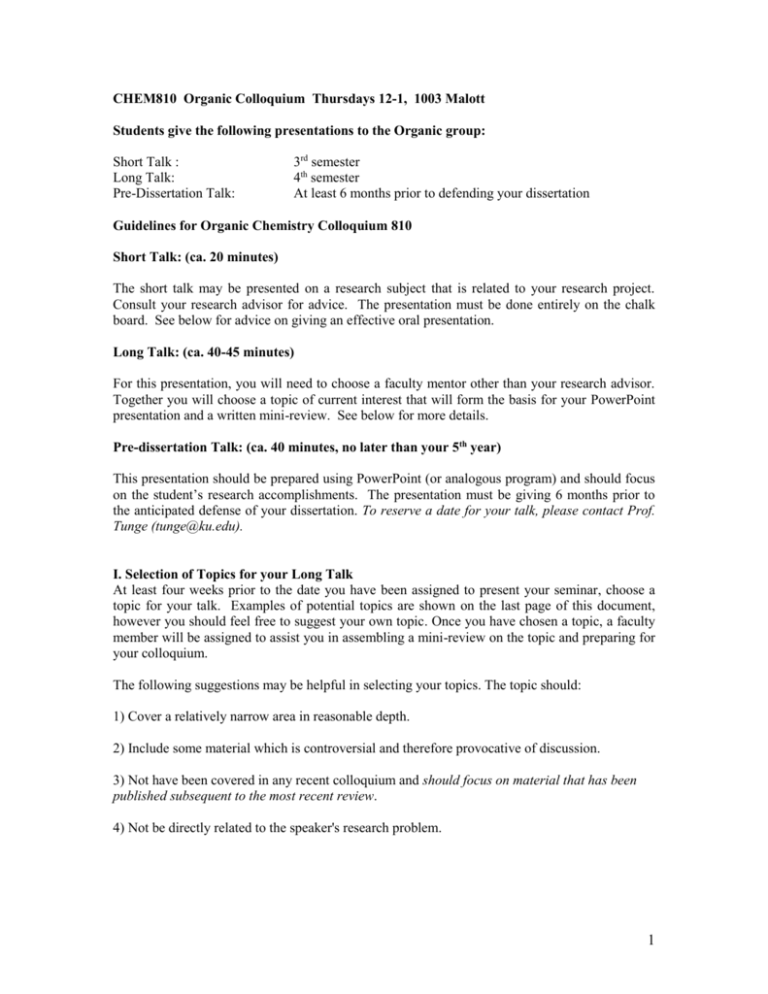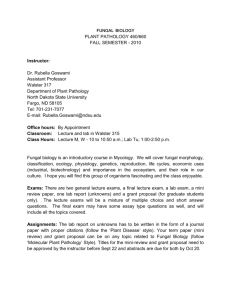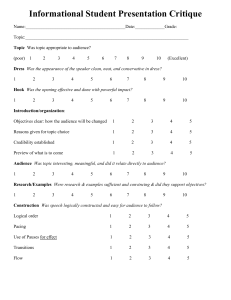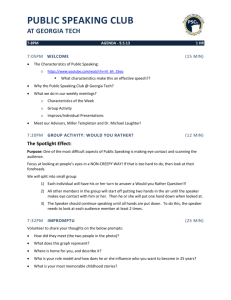Dear second year organic students
advertisement

CHEM810 Organic Colloquium Thursdays 12-1, 1003 Malott Students give the following presentations to the Organic group: Short Talk : Long Talk: Pre-Dissertation Talk: 3rd semester 4th semester At least 6 months prior to defending your dissertation Guidelines for Organic Chemistry Colloquium 810 Short Talk: (ca. 20 minutes) The short talk may be presented on a research subject that is related to your research project. Consult your research advisor for advice. The presentation must be done entirely on the chalk board. See below for advice on giving an effective oral presentation. Long Talk: (ca. 40-45 minutes) For this presentation, you will need to choose a faculty mentor other than your research advisor. Together you will choose a topic of current interest that will form the basis for your PowerPoint presentation and a written mini-review. See below for more details. Pre-dissertation Talk: (ca. 40 minutes, no later than your 5th year) This presentation should be prepared using PowerPoint (or analogous program) and should focus on the student’s research accomplishments. The presentation must be giving 6 months prior to the anticipated defense of your dissertation. To reserve a date for your talk, please contact Prof. Tunge (tunge@ku.edu). I. Selection of Topics for your Long Talk At least four weeks prior to the date you have been assigned to present your seminar, choose a topic for your talk. Examples of potential topics are shown on the last page of this document, however you should feel free to suggest your own topic. Once you have chosen a topic, a faculty member will be assigned to assist you in assembling a mini-review on the topic and preparing for your colloquium. The following suggestions may be helpful in selecting your topics. The topic should: 1) Cover a relatively narrow area in reasonable depth. 2) Include some material which is controversial and therefore provocative of discussion. 3) Not have been covered in any recent colloquium and should focus on material that has been published subsequent to the most recent review. 4) Not be directly related to the speaker's research problem. 1 II. Preparation of mini-reviews The text of the mini-review should fulfill the following requirements: 1) The mini-review should be a well-referenced, clear and concise report of the literature in the area. The mini-review should be prepared using the JOC Note template which is available at : http://pubs.acs.org/paragonplus/submission/joceah/joceah_templates.html. The mini-review is limited to 6 pages (with references) and it should highlight material that you will cover in more depth in your talk. 2) A printed copy of the final draft of your mini-review should be in the hands of the faculty member assigned to check it 1 week prior to the date it is presented. 3) The mini-review should be distributed two days prior to the presentation. Additional copies should be available at the time of presentation. 4) Valuable aids to good organic chemical writing can be found in the Fiesers' “Style Guide for Chemists” (Reinhold, 1960) and the Gensler's "Writing Guide for Chemists" (McGraw-Hill, 1961). Many common pitfalls, such as dangling constructions and misuse of verb forms, are dealt with in these manuals. Also consult the most recent "Handbook for Authors" (published by the ACS) for additional information (particularly the correct journal abbreviations). III. Presentation of Colloquia These suggestions are made to help speakers present talks that are effective and enjoyable to listen to. 1) The talk should not be read from your mini-review or notes nor recited from memory. A good talk written out makes a poor mini-review and vice versa. Whereas the mini-review should be a critical, tightly-written summary of material, the talk should contain as much background material as necessary to bring the audience to the level required by the subject and then should develop the subject with primary emphasis on important and fundamental aspects. Background material in the mini-review should be handled with a few well chosen references. Complex details cited in the mini-review for readers who might wish to study the subject more carefully may be wholly unsuited for oral presentation in the limited time available. A helpful guide for speakers in this respect is to avoid putting long tabulations of data on the board. 2) The interpretation of data presented should be that of the speaker, which may or may not be the same as that of the experimenter. If the speaker wishes to present views alternative to his or her own for sake of discussion, the reasons for them should be made clear. It should be self-evident that the speaker can neither form nor defend valid opinions without being thoroughly familiar with the data. It is not possible to prepare adequately for a seminar without studying the experimental sections of the paper to be discussed. “The author didn't say anything about that" is not an acceptable response to a question from the audience, because the listeners are interested in learning the facts and the speaker's opinions on the facts and not what the "author said." 3) With respect to the short “chalk talk”: The effectiveness of oral delivery is inversely dependent upon the frequency with which the speaker must refer to notes or cards. Most of us cannot remember numerical data, and an outline of topics to be covered helps one to avoid leaving out something important. However, it makes a very poor impression if the speaker cannot remember the structural formulas of compounds under discussion or if he or she must look at notes to recall the interpretation of some particular fact or idea. On the other hand, a thoroughly 2 memorized colloquium is also quite uninspiring. It is best to have the facts and ideas clearly in mind before the talk but to find the exact words during the talk. 4) Good contact with the audience is maintained by good delivery and by facing them as much as possible. Eye contact "brings the audience to you" and keeps them with you. Volume level should be strong and clear, so that everyone can hear easily. Excellent pointers on speaking as a chemist are given in Ch. 12 of the Fiesers' "Style Guide." 5) With respect to the short “chalk talk”: The chalkboard is to be used as the primary medium for presentation of your talk. Careful planning of how the board space is to be used contributes greatly to the success of a talk. The entire board space is to be used, starting from left to right, with erasing kept to a minimum. Occasionally, the use of colored chalk will be found to be helpful, but the speaker should practice with it beforehand. Only the most common substances should ever be referred to by names without writing the structures on the board. 6) With respect to the short “chalk talk”: With instructor permission, overheads can be used for presenting critical tables of data or unusually complex structures. 1) Weeks, D. P. “Successful Student Seminars” J. Chem. Ed. 1967, 44, 290-293 2) Huddle, P. A. “How to Present a Paper or Poster” J. Chem. Ed. 2000, 77, 1152-1153. Colloquium Calendar (Fall 2008): Grading: The talks will not be graded. That said, it is common practice to comment on the quality of your presentations within letters of recommendation that faculty write for you. Therefore it is in your best interest to make a favorable impression on the faculty by giving the highest quality presentation that you are capable of delivering. 3 Organic Seminar Fall 2014 Date Speaker Sept. 4th Sept. 11th Sept. 18th Sept. 25th Andrew Riley Oct. 2nd Oct. 9th Jay Jha and Martin Leon Oct. 16th Jonathon Matheny Oct. 23rd Xinyun Liu and Andie Cassity Oct. 30th Andrew Edwards and Arghya Ganguly Nov. 6th Joanna Loh Nov. 13th Nov. 20th Dec. 4th Dec. 11th Professor Neil Garg (UCLA) 4






